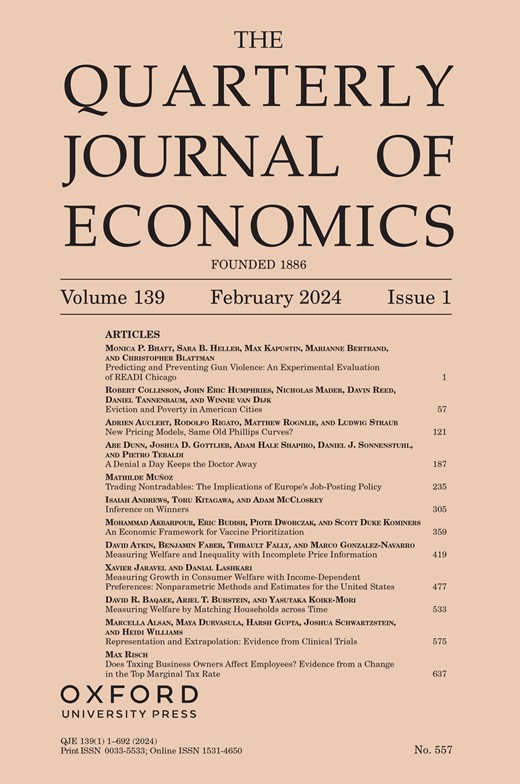Does Taxing Business Owners Affect Employees? Evidence from a Change in the Top Marginal Tax Rate
IF 12.7
1区 经济学
Q1 ECONOMICS
引用次数: 0
Abstract
Abstract Debates about the taxation of business owners often center on the distributional effects of these taxes, particularly the degree to which they affect workers. Drawing on a new linked owner-firm-worker data set created from U.S. administrative tax records, I analyze how an increase in the top marginal tax rate faced by business owners affected the earnings of their employees. I use panel difference-in-differences methods to compare the earnings of workers in similar firms but whose owners were differentially exposed to the tax increase. I estimate that 11–18 cents per dollar of new business income tax liability was passed through to employee earnings. I find no change in employment in response to the tax increase. The responses were generally associated with lower earnings growth, not changes in workforce composition. The burden was not borne equally by all workers. Essentially all of the workers’ share of the burden was borne by those in the top 30% of the earnings distribution, highlighting that the ultimate distributional effects of the policy depend not only on the share of the burden borne by workers but on the shares borne by different types of workers. Furthermore, since the owners bore the majority of the burden, the policy resulted in a decrease in after-tax earnings inequality between top-bracket owners and lower-bracket workers. I discuss the implications of the findings for the mediating labor market mechanisms and for welfare analyses of income taxation using a marginal value of public funds framework.向企业主征税会影响雇员吗?最高边际税率变化的证据
关于企业主税收的争论往往集中在这些税收的分配效应上,特别是它们对工人的影响程度。利用从美国行政税收记录中创建的新的业主-公司-工人关联数据集,我分析了企业主面临的最高边际税率的增加如何影响其员工的收入。我使用面板差异中的差异方法来比较类似公司中工人的收入,但这些公司的所有者受增税影响的程度不同。我估计,每1美元的新企业所得税责任中有11-18美分被转嫁到员工收入中。我发现增税没有使就业发生变化。这些反应通常与较低的收入增长有关,而与劳动力构成的变化无关。并不是所有的工人都平等地承担了这个负担。从本质上讲,所有工人的负担份额都由收入分配前30%的人承担,这突出表明,该政策的最终分配效果不仅取决于工人承担的负担份额,还取决于不同类型工人承担的份额。此外,由于业主承担了大部分负担,因此该政策减少了高收入者和低收入者之间的税后收入差距。我讨论了这些发现对中介劳动力市场机制的影响,以及使用公共资金边际价值框架对所得税的福利分析。
本文章由计算机程序翻译,如有差异,请以英文原文为准。
求助全文
约1分钟内获得全文
求助全文
来源期刊

Quarterly Journal of Economics
ECONOMICS-
CiteScore
24.20
自引率
2.20%
发文量
42
期刊介绍:
The Quarterly Journal of Economics stands as the oldest professional journal of economics in the English language. Published under the editorial guidance of Harvard University's Department of Economics, it comprehensively covers all aspects of the field. Esteemed by professional and academic economists as well as students worldwide, QJE holds unparalleled value in the economic discourse.
 求助内容:
求助内容: 应助结果提醒方式:
应助结果提醒方式:


